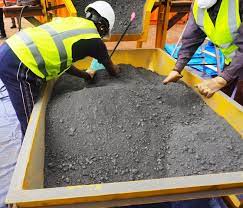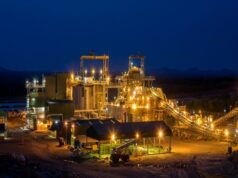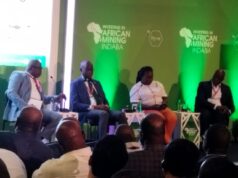After several postponements, the fine coal case was selected for trial on Tuesday 3 October 2023 at the Tribunal de Grande Instance de Ouaga I. After 3 months, the trial paused on 22 December 2023 and resumed on 28 December 2023. Between the appearances of the defendants, the clarifications of the experts and those of the representatives of the administration, and the verbal jousting of the lawyers, what can we really learn from this trial?
At the start of the trial, the defence lawyers challenged the composition of the prosecutor’s office because one of the 2 prosecutors had been appointed to a new post and the other assigned. “There are people who don’t have the right to be here”, said a lawyer from Essakane SA.
The President of the Court took note of the objection raised and joined it to the merits. He ordered the opening of the hearing.
The debates will linger once again after this exemption. In addition to the fine coal at the centre of the case, other materials weighing more than 100 kg of an atypical nature have been isolated from 2 canteens for analysis.
Essakane’s defence lawyers felt that, at this stage, the analyses did not allow the material to be classified as gold. For the legal experts, the elements contained in the 2 canteens were qualified as “solid bodies”. But the prosecutor, the State’s lawyers and those of the National Anti-Corruption Network (Réseau national de Lutte-Anti-Corruption – REN-LAC), which is a civil party in the case, insist with certainty that it is gold, and specifically gold ingots.
The two canteens were presented to the court the following day. In response to a question from the prosecutor, the experts took the view that, in terms of the technical and material aspects of fine coal processing, these elements should not be found in the canteens.
But the mine’s lawyers countered. “Do all mines have the same process for treating fine coal?” “No!” replied the experts. “Does the fine coal treatment process at Essakane involve these elements?” “Yes”, say the experts, who point out that Essakane has used fine coal processing elements (sieves) that do not comply with standard norms, hence the fact that these “solid bodies” are found in the containers.
The contents of the 2 canteens were analysed during a suspension of several days.
Is Essakane involved in gold marketing fraud?
When the hearing resumed on Monday 6 November 2023, the debates took another turn, that of finding out whether there had been fraud in the marketing of gold by the Essakane mining company. Tidiane Barry, Managing Director of Essakane, was called to the stand and stated that he did not recognise the facts concerning the charge of fraud in the marketing of gold.
However, the experts revealed a number of anomalies in shipments containing Essakane coal. In their view, the fine coal from Essakane does not conform to that from other mines, and they have pointed out that the gold content found in the Essakane fine coal is abnormally high. It is impossible to obtain a grade of 806 grams of gold per tonne (806g/t), whereas the Essakane fine coal should normally be 63g/t, according to the same method used by Essakane.
Called to the stand, the prosecutor’s expert (a chemist) added that “the coal described as ‘fine’ by Essakane is not fine coal, it is ore”. According to the prosecutor’s expert, Essakane deliberately manipulated the moisture content to reduce the amount of gold contained in the fine coal.
However, the 2 forensic experts questioned the method used by the prosecutor’s expert, describing it as “unrecognised”. On the question of the humidity level falsely declared by Essakane, the experts also asserted that it had no link with the gold content of the fine coal.
Following the trial on Wednesday 8 November 2023, the 2 legal experts indicated that the type of fine coal observed at Essakane should not be found.
“Let’s suppose that the Essakane system is as faulty as possible, can we end up with gold contents of such magnitude in the fine coal?” asks Me Prosper Farama, REN-LAC’s lawyer. “No! We can’t end up with such a high content” declare the experts.
The lawyer comes back to the point: “There are 2 possible explanations for this content: accidental or human error. Which do you think is more likely?” “It’s the human one”, replied the experts.
“In the human hypothesis, there are also two cases: either it’s intentional or unintentional. Which do you think is the more likely hypothesis?” replies Mr Farama. “It’s the intentional factor,” replied the experts.
But Essakane’s lawyers were quick to react. “As regards the other minerals found in the fine coal, such as zinc and manganese, can they be traded internationally in the quantities contained in the fine coal?” they asked the experts. “On an international or sub-regional level, these masses are negligible”, replied the experts.
During the trial on Thursday 9 October 2023, the two experts also stated that the pulp content found in the cargoes was 67g/t according to their expertise, whereas in the case of Essakane it should be 0.1g/t.
The judge then asked the experts what could explain the high gold content. The experts explained that the problem could lie in the incineration of the pulp or in leaks in the solution, which could influence the gold content. But one of the experts pointed out that the latter hypothesis should be ruled out, as these leaks cannot influence the gold content of the pulp.
The prosecutor then turned his attention to the scales used by Essakane to weigh the coal. From the discussions, it emerged that the scale that Essakane’s CEO claimed was certified was not actually certified. Indeed, Essakane claims to have been certified in 2016, whereas the scales were weighed in 2018.
False declaration?
In the continuation of the trial on Tuesday 28 November 2023, the question was whether the Essakane company had made a false declaration of the quantity of fine coal contained in its cargo.
At the start of the proceedings, the prosecutor pointed out that Essakane had declared 399,069 kg of fine coal, whereas after the seizure it was found to be exporting 629,000 kg of fine coal.
However, Essakane’s country representative explained that the figures declared by Essakane were estimates and not exact, hence the discrepancy noted by the public prosecutor, who believes that these margins of error are in fact margins of fraud.
At this stage of the proceedings, the prosecutor called a customs expert to the stand.
He explains that in its export application letter, Essakane declared half of 447,288 kg (i.e. 223,614 kg). But in 2015 it exported 399,059kg; in 2016, 281,234kg; and in 2018, 494,635kg was being exported, making a total of 1,174,928kg compared to 447,288kg, so the surplus is 697,640kg. According to him, this is a false declaration.
Essakane’s lawyers intervened in the debates to make it clear that “Essakane didn’t just get up and leave its cargo with Bolloré”. It had received authorisation from the Ministry of Mines, Customs and BUMIGEB. The defence lawyers also pointed out that, at the time of export, it was indeed the 399,059 kg that had been authorised by the Ministry.
But the customs expert made it clear that the special export authorisation was not issued by the ministry responsible for mines, but by the secretariat of the one-stop shop for trade. He added that Essakane was well aware that Burkina Faso legislation did not allow it to export fine coal. “In the history of mining in Burkina Faso, no mine has ever exported fine coal; they store it on their sites,” he said. He then showed a press document. In this report, the director of the Essakane plant justified the construction of a fine coal incinerator by the fact that national legislation did not authorise the export of fine coal. The presentation took place on the sidelines of SAMAO 2017, in the presence of the Minister of Mines.
Did Essakane have the right to export fine coal?
It should be noted that the prosecutor’s customs expert was later contradicted (on Tuesday 5 December 2023) on the possibility of exporting by a representative of the customs administration (Director of Regulations, Facilitation and Customs Cooperation). The latter stated that the legislation did indeed allow Essakane to export fine coal. However, he acknowledged the false declaration, but played it down by referring to it as a “simple contravention”.
With regard to the press document, the Essakane Country Representative explained that their plant manager had stated that Burkina Faso’s legislation did not permit the export of fine coal, because at the time there was a legal vacuum on the issue, which had been filled by the time he spoke.
“To this day, we defy anyone to provide the legal basis that would allow the Minister of Mines to authorise the export of fine coal. This legal basis does not exist”, replied the State’s lawyer.
BUMIGEB gives its version
The Burkina Faso Bureau of Mines and Geology (Bureau des Mines et de la Géologie du Burkina Faso – BUMIGEB) was called to give its side of the story on Friday 8 December 2023. Its representative (a chemical engineer) stated that the humidity level has an impact on the calculation of the quantity of gold whereas Essakane.
The prosecutor made the following comment to the president of the court: “There have been attempts to confuse you by saying each time that the humidity level is of no importance, whereas BUMIGEB’s answer is surgically precise: the humidity level is very important”.
The BUMIGEB representative also stated that his institution was not involved in the various stages of exporting the Essakane fine coal, whereas at the previous hearings, the Essakane country representative and her lawyers repeatedly stated that they had involved the Burkina Faso authorities in the entire process of exporting the fine coal (weighing, providing samples, loading, etc.). He points out that the BUMIGEB agents were only involved in the packing stage.
Regarding Essakane’s version that their samples were also sent to BUMIGEB for analysis, the BUMIGEB representative confirmed that Essakane sent them the samples but explained that BUMIGEB was not involved in taking the samples.
Two public officials called to the stand
On Tuesday 12 December 2023, the trial continued with the appearance of two public officials as defendants. They had to prove their innocence on the charge of forgery.
They suggested that they were simply carrying out the orders of their superiors. They also added that they had carried out their mission in accordance with their mission order, which instructed them to take part in weighing and packing the coal at Essakane. The two agents also stated that they did not take part in the operations to bag the fine coal. However, the prosecutor criticised the agents for not trying to find out what was in the bags, even though they stated that their mission was not to find out what was in the bags.
The lawyers for the two agents pointed out to the court that their clients had signed the weighing reports in the name of the administration they represented during their mission and not in their personal name. The two agents are being prosecuted for forgery of documents relating to the bagging reports, even though they did not participate in the bagging of the fine coal. Their lawyers argue that they are also being prosecuted for forgery of a private commercial document, even though the minutes are not a commercial document, argue their lawyers.
In addition, their lawyers pointed out to the president of the court that their clients had been heard (auditioned) without their lawyers and without being notified of their rights, in breach of the Code of Criminal Procedure. They therefore requested that the investigation minutes be declared null and void. As a result, the current proceedings against the 2 officers are null and void. In this case, the president of the court declared that the court accepts the exception of nullity and joins the exception to the merits.
After the appearance of the two public officials, the presiding judge suspended the hearing at the request of the defence lawyers on the grounds of preparations for the Christmas holiday. It will resume on Thursday 28 December 2023.
Georges YOUL
#Mines_Actu_Burkina










